I just recently watched
Spider-Man: Homecoming again, and Michael Keaton's memorable turn as the movie's villain got me thinking over the different adversaries which we've been offered in the many films and TV shows of the Marvel Cinematic Universe (MCU). It's hardly controversial to suggest that, as well as the MCU has handled certain elements of their shows, their villains haven't been one them.
When it comes to superhero tales, whether in comic books, TV, or movies, the villains have the potential to be just as interesting as the hero. Alternatively, they can also just be dull punching bags for the protagonists to unload their powers upon. When I consider how "interesting" a villain is, I'm not considering their raw power, so this ranking is not meant as my sense of which characters could defeat the others in a fight. Rather, I'm considering how compelling they are, based upon their back stories and how they are presented in these particular movies or TV shows. Of course, any superpowers they may have can be part of the equation, but to me this always takes a back seat to their motivations and other characteristics. Another part of my thinking here is also how much wit and cunning they may have, as I find those traits much more fascinating than sheer physical strength. This can depend upon the writers, to be sure, but that is part of what can make or break any character.
As a brief explanation, I count that there have, up to this point, 33 different "main" villains in the MCU. While some movies have a single, clear-cut, main adversary, there are a few of the shows in which there are two and even three foremost villains. I am dividing them into "films" and "TV shows," since by nature the TV shows have more time for character development, giving them a fairly significant advantage in this department. For the TV shows, I am only listing the main villains who were the primary adversaries for the heroes throughout most or all of a particular season. For example, I'm not including Mr. Hyde from season 2 of Agents of S.H.I.E.L.D. since he eventually broke good by season's end. In only one case is the "adversary" a somewhat nebulous group. So here they are, each with a little explanation:
TV Show Villains
 |
The would-be Moon non-Inhuman, Inhuman conqueror,
Maximus. One of the vey few completely flubbed TV show
villains. |
#17: Maximus: Inhumans, season 1
I know this show still has a couple of episodes to go, but I'm confident that my perception won't change. Like nearly everything about
Inhumans, Maximus is lame. I don't even lay this one in any way at the feet of actor Iwan Rheon, who seems to be trying. This one, like everything about this series, was severely weakened by half-baked writing, which permeated everything about this show's plot, characters, and dialogue. There was actually a semi-compelling blueprint at work for Maximus, as the powerless member among an Inhuman royal family who all have extraordinary superpowers. Alas, a sloppy and unengaging narrative took any potential wind out of the sails that this character may have had.
#16: Harold Meachum - Iron Fist, season 1
I blame this one on sloppy and/or lazy writing. Over the course of the 13 episodes of the initial season of
Iron Fist, Harold Meachum never hit any consistent stride for me. It didn't help that he was yet another "white businessman who wants to take control of things" when this had already been done several times. On top of that, though, he was ineffectual and showed little coherence from one episode, and sometimes from one scene, to the next. I wasn't much of a fan of
Iron Fist in general, and Meachum being the primary adversary was a big part of it. His "finale" fight with Danny Rand in the final episode is easily the lamest and most nonsensical final showdown of any MCU product to date.
#15: Johann Fennhoff/Doctor Faustus - Agent Carter, season 1
A sinister manipulator, Fennhoff wasn't exactly well-rounded, evoking no sympathy from us viewers. However, as an unassuming old doctor, he was able to trick, con, and bend other strong characters to his will, making him a villain worthy of a certain respect and ire. It was satisfying seeing him taken down by Peggy and her colleagues at the SSR.
#14: Willis Stryker/Diamondback - Luke Cage, season 1
One of several villains whose potential was not reached. Stryker, a.k.a. Diamondback, was teased for much of the first season of
Luke Cage, but was ultimately just an angry dude with some big guns and a powersuit. Being Luke Cage's half brother gave him a little more character, but when he emerges as Cage's main adversary, he's made a bit too crazy and even zany to take overly seriously. This was one whose buildup was far greater than the final product, and he wasn't helped by the fact that he was meant to be a bigger, badder, scarier villain than the guy for whom he took over, Cornell "Cottonmouth" Stokes, who was much more interesting.
_Marvels_Agents_of_SHIELD_2_17.jpg/revision/latest?cb=20150415160224) |
Her tortured backstory gave her some weight and a dash of
sympathy, but Jiaying was never an overly compelling
villain during her run on Agents of SHIELD. |
#13: Jiaying - Agents of S.H.I.E.L.D., season 2
An immortal who kept herself alive by sucking the life force out of others, Jiaying was driven by pure revenge. After being tortured and experimented upon by HYDRA scientists, her rage was understandable, making her a more developed character. Still, once her backstory was revealed a bit, she became less compelling, and I could only see her as a vengeful character who had lost all connection to humanity. It became rather dull by the end, and she had no other curious powers to spark any further interest.
#12: The Hand & its "Fingers," Madame Gao, Nobu, etc. - Daredevil, seasons 1 & 2; The Defenders, season 1
This group of shadowy ninja and the sometimes-rotating leadership of its "Fingers" has had potential to be more compelling, but it hasn't quite gotten there for me. Through the first two seasons of
Daredevil and the recent initial season of
The Defenders, it was a long, slow build towards their nefarious plan to unearth a bunch of dragon bones in order to gain vast powers, even beyond those of immortality which many of its members already possess. Still, the army of ninja itself is rather dull, while its quintet of leaders have been somewhat underwhelming, despite showing some promise from time to time.
#11: Mariah Dillard - Luke Cage, season 1
Another villain with no super powers or gadgetry to convey physical prowess of any sort, Dillard was the political arm of the crime empire co-run by her half brother, Cornell Stokes. Mariah shared much of Stokes's difficult upbringing, which gives her a certain amount of sympathy as a character. She is also a hard-as-nails, clever survivor, making her formidable in her way, despite not being much of a physical threat.
#10: Hive - Agents of S.H.I.E.L.D.,
season 3
Hive was one of the more interesting villains, given its power and the fact that it was using the corpse of Grant Ward as its husk on earth. The mystery building up to its true nature was well-executed, and its position as a would-be ruler over Inhumans was also a rather novel concept for the MCU. Its ability to take over and control any Inhuman made it truly frightening, though it was ultimately a purely villainous force. By evoking no real sympathy, it remained limited in just how interesting it could have been as a villain.
 |
Whitney Frost, who I feel had the potential to actually be #1
on this list. With just a dash more imagination and some
tighter writing on season 2 of Agent Carter, she could have
been the most fascinating villain in the MCU TV shows. |
#9: Whitney Frost - Agent Carter, season 2
Of the many underserved villains in the MCU, I feel that Whitney Frost was perhaps done the greatest disservice. There was a
lot of untapped potential in this character, and the writers only scratched the surface with her. She was a brilliant scientist who, like many women in the
Agent Carter world, was underestimated and ignored simply because of her gender. When she merges with the sinister Dark Matter, she becomes frighteningly powerful, even if she can't completely control it. Alas, I felt that her story came to a rather flat ending. With some slightly better writing and a little more imagination, Frost could have been one of, if not
the, most interesting villain in the MCU TV shows.
#8: Wilson Fisk/The Kingpin - Daredevil, seasons 1 & 2
Wilson Fisk's story is still unfolding, but the Daredevil series has done him decent justice. I still think that they haven't done the greatest job filling in the gaps of how he went from seemingly-dull, impoverished Hell's Kitchen schlub to and immensely shrewd, dominating, and physically powerful crime lord. I've also never enjoyed the Mommy issues that reared their head in the first season of Daredevil. I expect Kingpin to be beyond such obvious sore spots and be a bit more of a force of sinister nature. I must also admit that I've never completely loved the casting of Vincent D'Onofrio, though this is based mostly on my feeling that he doesn't have the genuinely powerful physique which I hope for in the Kingpin.
#7: Cornell Stokes/Cottonmouth - Luke Cage, season 1
Probably the most surprising plot turn in any Netflix MCU show was seeing Cornell Stokes get killed. It had great impact since I never saw it coming when it did, and he had by then become a very well-developed, strong, and fairly deep character. Not to mention that he had been played so wonderfully by the brilliant Mahershala Ali. Stokes was a self-made made who came from a very rough background but had risen to local power in Harlem through his influence in the criminal and entertainment worlds. When Stokes was taken out, I saw it as a gutsy move by the writers, thinking that an even better villain would take his place. Unfortunately, I was wrong, with Willis "Diamondback" Stryker not being nearly as well-rounded as Stokes.
#6: Elektra Natchios - Daredevil, season 2; The Defenders, season 1
Elektra could be at the top of this list with some slightly tighter writing. She is compelling as an intrinsically homicidal killing machine, who has been trained as a world-class fighter and even brought back to life by the nefarious Hand. Elodie Yung plays the part well, even though I still don't totally buy her physical fighting prowess as a one-woman army. Her entire love/hate, redemption/damnation themes with Matt Murdock haven't completely gripped me the way that I think the writers would like, though the potential is still there.
 |
Far from the most physically imposing,
Kilgrave was the most frightening and
depraved villain we've yet seen. |
#5: Kevin Thompson/Kilgrave - Jessica Jones, season 1
Kilgrave was easily one of, if not
the, scariest and creepiest of MCU villains, TV show or film. His power to convince anyone to do anything simply by telling them to do so it scary enough, but when added to his complete lack of morals and thoroughly depraved self-absorption, it made for a terrifying adversary. The only thing that keeps him a bit lower on this list for me is that he was almost
too completely villainous. Yes, we get some backstory about how he was tortured by his parents, probably leading to his warped view of the world. Still, he remains thoroughly repugnant, and there is never much question as to what Jessica Jones needs to do to put Kilgrave's terror spree to an end.
#4: Brad Garrett - Agents of S.H.I.E.L.D., season 1
This guy was just plain fun. One of the higher-ranking HYDRA sleeper agents posing in SHIELD, Garrett helped really screw over Agent Coulson and the gang. And he had a great time doing it. Played to a perfectly mischievous tee by the legendary Bill Paxton (R.I.P.), Garrett smirked and wise-cracked his way through stabbing a ton of people in the back, and it was immense fun watching him do it. He was only in about a half dozen episodes, but he made an indelible impression.
#3: Grant Ward - Agents of S.H.I.E.L.D., seasons 1, 2, & 3
Grant Ward had a really interesting arc. From trusted SHIELD agent to traitor, his story was a surprising and compelling aspect of the show's first season. And while it becomes clear by that first season's end that Ward was a thoroughly warped individual, the writers often suggested that there just might have been some slim chance at redemption within him. Such was not the case, but the possibility made Ward more fascinating, along with his immense skill as a secret agent and combatant.
#2: AIDA/Ophelia - Agents of S.H.I.E.L.D., season 4
One of the stronger, more unique villains, AIDA was a life model decoy which attained self-awareness and really have the SHIELD agents a run for their money. Initially designed as a prototype android to house a brilliant scientist's visionary artificial intelligence, AIDA came into contact with the occult book The Darkhold, imbuing her with not only a vastly new perspective of the universe but also a sense of self. This origin story alone makes her a curious figure, but the way that she puts the entire SHIELD team through the wringer was pretty epic. And she/it actually becomes a bit sympathetic in a few ways, as cold and brutal as she can be much of the time.
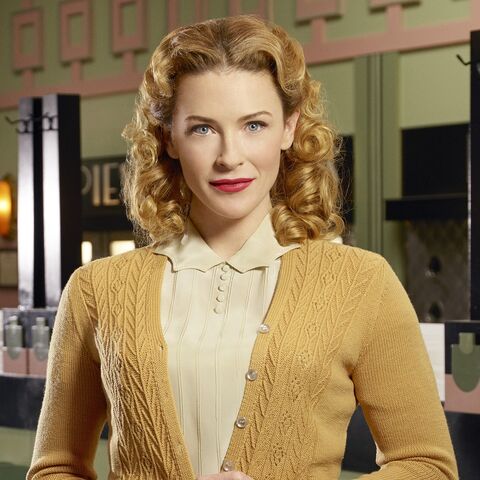 |
Who would guess that this be-
sweatered sweetheart is one of the
toughest, most ruthless and lethal
assassins in the MCU? |
#1: Dottie Underwood - Agent Carter, seasons 1 & 2
Dottie is another character who, while not a heavy hitter, had more character and novelty than most villains in the MCU. Like her heroic counterpart, Peggy Carter, Dottie is in many ways a product of the rampant chauvinism and misogyny that thoroughly dominated the world around them in the post-World War II era. While Peggy fought against this as much as possible, the lethal Underwood used it to her distinct advantage, and she was a really fun villain to watch go to work. I enjoyed that we can see her as what Natasha Romanov/Black Widow would have been if she had remained a ruthless assassin.
Movie Villains
Note: I'm not including "The Mandarin," Trevor Slattery, even though he is initially put forth as a villain in Iron Man 3
. Since he is revealed as a fraud, I don't count him (though I loved that plot twist and Ben Kingsley's hilarious portrayal of the drugged-out, washed up actor).
#18: Justin Hammer - Iron Man 2
What makes me angry about this one is that the phenomenal actor Sam Rockwell played the role. And as good an all-around actor as he is, the Justin Hammer character defies explanation. Hammer is supposed to be a weapons designer and manufacturer somewhere on the same level as the brilliant Tony Stark. And yet he doesn't do a single thing right in
Iron Man 2 and is purely a buffoon. They could have done far better with him than relegate him to purely comic relief.
 |
The Destroyer. Fairly cool in terms of destructive power, but
there was absolutely nothing beyond that. |
#17: The Destroyer - Thor
Even though it was really Loki pulling its strings, I'm including The Destroyer since it did square off against Thor and his companions in the final act of the original movie. It had a cool look and a few interesting abilities, but it was basically just a mute, Gort-like killing machine. Not much to sink your teeth into there.
#16: Ronan the Accuser - Guardians of the Galaxy, vol. 1
This guy was as dull as they come. Just an angry, super powerful figure who simply wants to destroy things. The movie does allude to a potentially interesting motivation for his anger, but it never delves into it in any way that makes Ronan more interesting.
#15: Malekith - Thor: The Dark World
Similar to Ronan, Malekith is a one-note character who is basically out to destroy the world. We do get a touch more backstory than with Ronan, in how his race of dark elves was nearly eradicated by Odin, but Malekith himself never becomes more than another angry, would-be world-destroyer.
#14: Emil Blonsky/The Abomination - The Incredible Hulk
There was potential for more with this soldier-turned-rage monster, given his decorated military history, but it was mostly fumbled or ignored. What we got was basically just the "bad" version of the Hulk here - a huge, gnarly creature with immense physical strength that could have a huge wrestling match with the Hulk in downtown New York City.
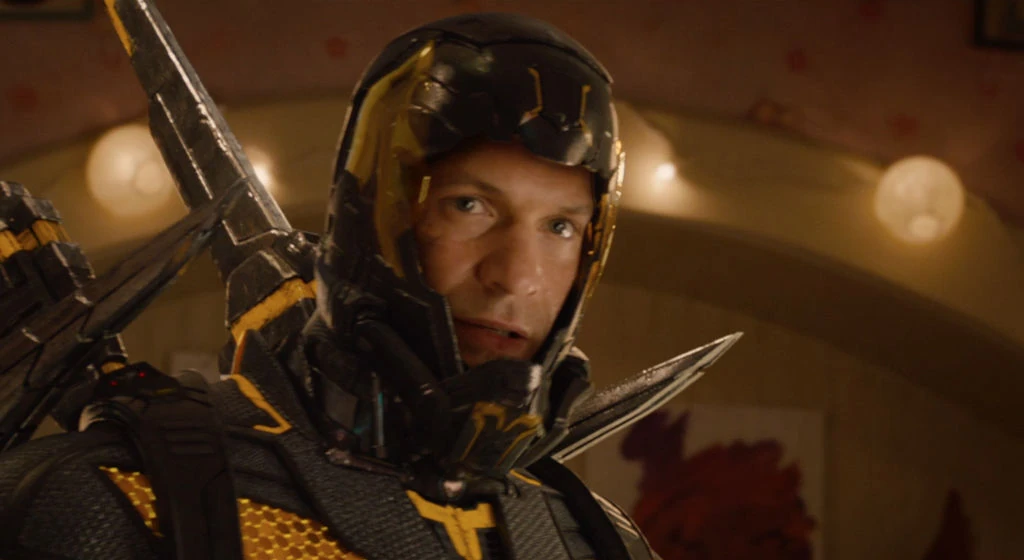 |
"I know this plan completely failed for Obadiah Stane, but I
think I can make it work!" |
#13: Darren Cross/Yellowjacket - Ant-Man
By the time
Ant-Man hit the screens, the Darren Cross character blueprint had been stale for a while: a smart, calculating, white guy with a sharp wardrobe and an ax to grind. He really is basically just another clone of Obadiah Stane from the very first MCU film,
Iron Man. He uses a suit similar to the hero, in an effort to take over a large corporation. He's also portrayed as overly sleazy and petulant right from the start, making him less compelling.
#12: Obadiah Stane/The Iron Monger - Iron Man
Thanks to some decent writing and a typically solid performance by Jeff Bridges, Stane becomes slightly more interesting than some villains in the MCU, but he was still never totally fleshed out. His motivation for usurping the Stark Company never goes beyond base greed, and just why he thought the final solution was using a giant metal suit to kill Tony is an insult to a character who, up until the final act, was supposed to be extremely intelligent.
#11: Ivan Vanko/Whiplash - Iron Man 2
While Mickey Rourke perhaps didn't do this character too many favors with his odd portrayal of him, Vanko was at least a bit more curious than several other MCU villains. He actually had a clear motivation beyond mere power acquisition, and he was quite intelligent and even physically imposing, even without his arc-reactor whips. Having a shadowy background from grimy back alleys in Russia, he made a curious counterpoint to the born-into-wealth Tony Stark. The writers could have done more with him, but opted to shoehorn in the goofy Justin Hammer character, unfortunately.
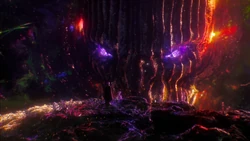 |
Dormammu is likely the most powerful adversary we've seen
in the MCU, even if there's not much else to it as a character. |
#10: Dormammu - Doctor Strange
Something of a force of cosmic nature, Dormammu isn't much different from would-be world-destroyers like Ronan or Malekith. The only thing that elevates him is that his nature is on such a massive scale and of such a bizarre, supernatural bent that it becomes a bit more novel. To this point, we haven't seen an adversary with as much raw destructive power as Dormammu, even though there doesn't seem to be anything more to it.
#9: Kaecilius - Doctor Strange
Another villain who had more potential than was actually tapped in the movie. He was the first "occult" villain to really emerge in the MCU, and seemed to be a decent adversary for Doctor Stephen Strange. He was clearly a highly skilled practitioner of the mystic arts, and there is some semblance of a motivation springing from some sort of loss in Kaecilius's background. Ultimately, though, he is just a fantatic. And fanatics, just like Ronan the Accuser, are generally pretty boring. Another semi-waste of a great actor in Mads Mikkelson.
#8: Johann Schmidt/The Red Skull - Captain America: The First Avenger
The Red Skull was basically another fanatic, but at least he was an intelligent and capable one. I found it interesting that he was not only a powerful leader but one who embraced the occult to a point that it led him to the Terreract. He was also the original recipient of the Super Soldier Serum which gave Steve Rogers his considerable physical abilities. Schmidt didn't really have too many dimensions to him, but I found him a worthy adversary for Captain America.
#7: Alexander Pierce: Captain America: The Winter Soldier
Pierce has a curious place on this list, being one of the very few villains who has no superpowers, physical prowess, or advanced personal weaponry. He was purely a political figure, but one whose political power and allegiance to HYDRA put him at the center of one of the biggest shakeups in MCU history. Pierce was obviously extremely intelligent and deceptive, and he even made a few compelling arguments for his worldview. As far as comic book villains go, he was imposing in his own way, though not nearly as frightening as certain others on the list.
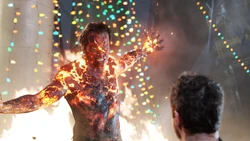 |
Though not much of a "front and center" villain,
I appreciated Killian's intellectual and physical
abilities, along with his cunning. |
#6: Aldridge Killian - Iron Man 3
The third Iron Man is maybe the most divisive MCU film, due in no small part to the "Mandarin" bait-and-switch plot twist (I loved it, by the way). The man really pulling the strings, though, Aldridge Killian, was actually a fairly interesting villain. Spurred on by a combination of revenge and spite, Killian transforms himself from a smart but frail scientist with almost no confidence into a bio-engineering mogul who, secretly, has imbued himself with considerable powers of strength, regeneration, and even fire breath. He is, unfortunately, yet another villain who lacks much sympathy, but the combination of attributes and his backstory elevate him above many other similar MCU villains.
#5: Ego, the Living Planet - Guardians of the Galaxy, Vol. 2
Next to Dormammu, Ego is the most powerful villain we've seen in the MCU. But he also had a rather fun and curious backstory, with its connections to Peter "Starlord" Quill. Yes, the plot to basically homogenize the entire galaxy into versions of himself is yet another tale of a world-devouring cosmic entity, but there was something of a human touch brought to the character, thanks to some decent writing and a great performance by the legendary Kurt Russell.
#4: Helmut Zemo - Captain America: Civil War
One of my more controversial picks, perhaps, but I thought Helmut Zemo one of the most impressive villains in the MCU. As one of the few adversaries without any sort of superpower or even any high-tech gadgetry, this former Sokovian black operative single-handedly drove a massive wedge between nearly all of "Earth's Mightiest Heroes" through surgical planning and immense patience. While his motivation was basically one of revenge for losing his entire family during the Avengers' fight against Ultron, there's actually a bit of pathos to the man. It helped that he was played wonderfully by Daniel Bruhl, and I hope that the character is utilized in the future.
#3: Adrian Toomes/The Vulture - Spider-Man: Homecoming
Many may disagree with my high placement of The Vulture on this list, but I think he's one of the most well-rounded villains in the entire MCU, and arguably
the most well-rounded of all of the movie villains. Unlike nearly all others, Toomes is a street-level guy with cunning, guts, and a perfect sense of exactly who he is and where his place is in the MCU world - a lower-tier guy who can stay under the radar with his criminal dealings and support his beloved family. The character was well-conceived, executed, and played brilliantly by Michael Keaton.
#2: Ultron - The Avengers: Age of Ultron
The movie in which he is introduced has its flaws, but I still think Ultron is one of the most imposing, creative villains in the MCU. His origin as an amalgam of alien artificial intelligence and Tony Stark's JARVIS A.I. was certainly creative. The first time I watched the movie, I found Ultron's weird sarcasm and personality quirks confusing and off-putting, but once I realized that they were a warped version of Tony Stark's personality, it made more sense and made the character more intriguing. Add in his physical strength, ability to send his consciousness nearly anywhere on earth, and his unhinged plan to wipe out much of humanity, and you had a villain to be reckoned with.
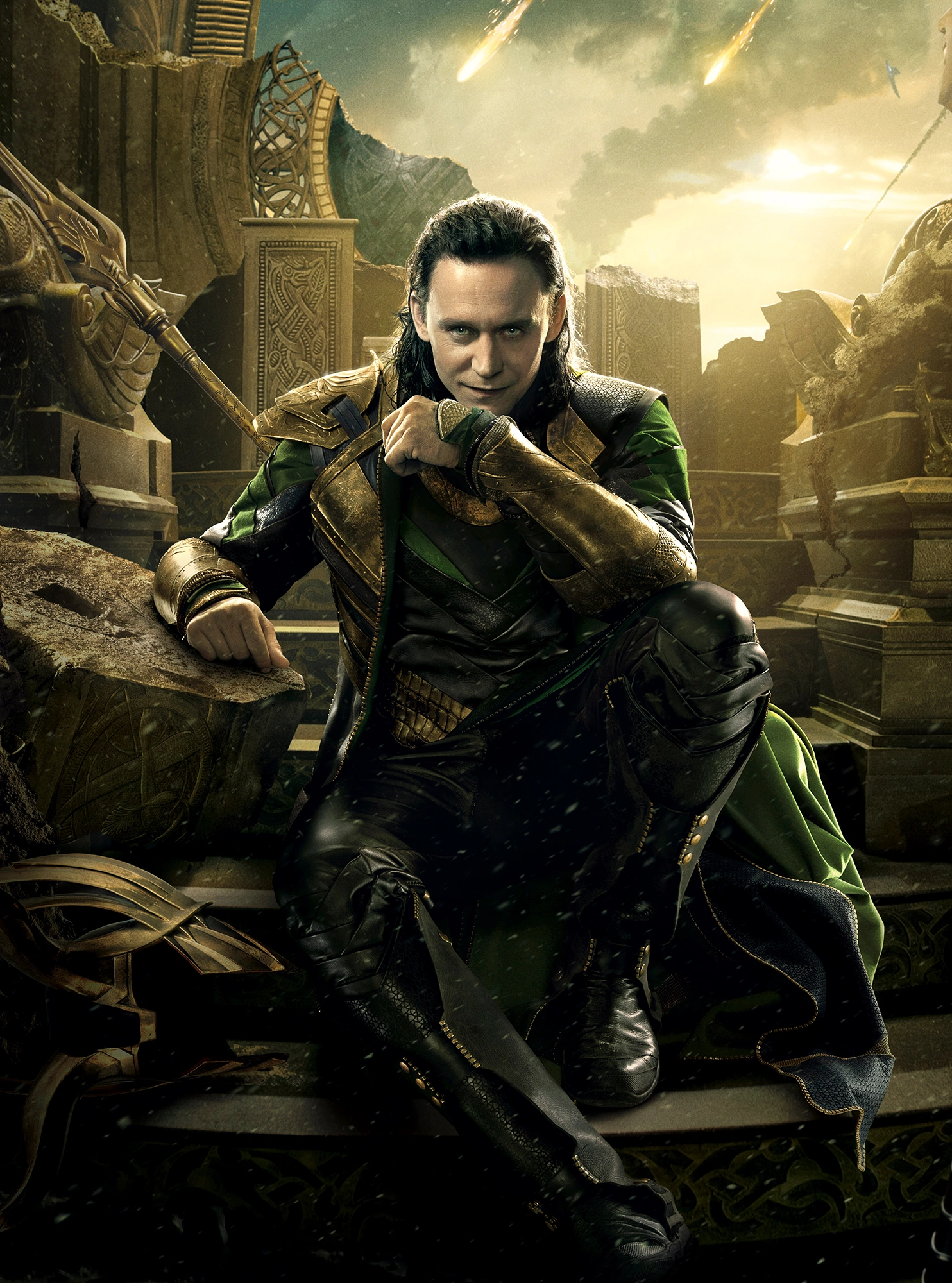 |
Loki's MCU incarnation has lived up
to the legend better than any other
villain in the universe. |
#1: Loki - Thor; The Avengers
The very best we've yet seen. Loki is exceptionally cunning, strong, and is one of the most well-rounded and charismatic of all MCU villains, thanks in no small part to consistently entertaining performances by Tom Hiddleston. With his background as second-fiddle, adopted brother to the more glamorous Thor, Loki has a long-burning jealousy and hatred of his more beloved adoptive sibling. His dynamic with his family is downright Shakespeareian, and Hiddleston conveys Loki's scheming and charisma brilliantly, which is probably why he's been brought back again and again. To this point, he is really the only true "wild card" among MCU villains, who could switch to either side in a blink, and whom we can root for or against with equal enthusiasm. That's no mean feat.
So there they are - my thoughts on MCU villainy. One observation I had while putting this list together is how much more diverse the villains have been in the TV shows. Out of the 17 main villains, six have been women and three have been African-American (with Mariah Dillard being both). That's opposed to the films, where there hasn't been one single human (or even humanoid) villain out of the 15 possibilities who wasn't a white guy. That's about to change in the next few MCU flicks
Thor: Ragnarok,
Black Panther, and 2019's
Captain Marvel. It's long overdue, to be sure, and it'll be nice to see more variety.
All told, there have been a few solid baddies in MCU, but this is probably the one main area that Marvel can step up its game. They've pretty well nailed the superhero fantasy aesthetic, fun tone, and heroic characters with impressive consistency. If they can only get deeper and more imaginative with their villains, then we fans of the movies and shows will have some real classics to feast upon.
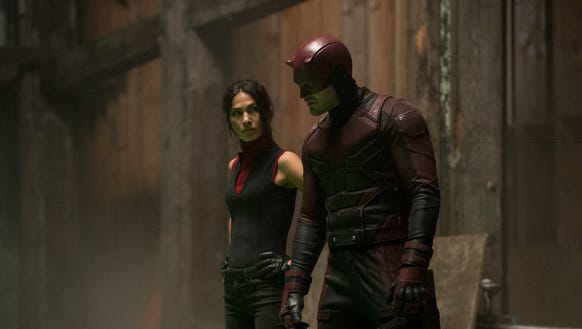



_Marvels_Agents_of_SHIELD_2_17.jpg/revision/latest?cb=20150415160224)








